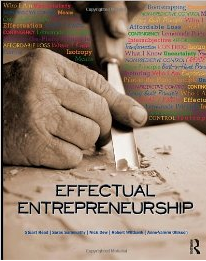Last week I discussed a study done on Entrepreneurs by Sara Sarasvathy that I found fascinating. Her study analyzes the characteristics, habits and behaviors of what she calls the species entrepreneur. She traveled to 17 states and met with 30 founders of companies ranging from $200M to $6.5B, covering a variety of industries.
So what she determined is that there are 2 methods of reasoning, effectual and causal. The causal approach is one that you commonly find in books. This is where you have a predetermined goal, a given set of means, and you work to identify the most optimal, efficient, and financially feasible way of reaching the set goal.
The alternative is the effectual approach. This is the method of the entrepreneur, and it is when you have a particular set of means, and out of that comes the goal. This happens with the day to day feedback you receive from employees, partners and the marketplace.
Causal thinking is much more structured, whereas Effectual thinking is more creative and exploratory. Most people can think both ways, but the startup entrepreneur tends to prefer effectual reasoning for new ventures. Sara used cooking dinner as a great example of using both types of reasoning. The chef that goes into their own kitchen, knowing exactly what ingredients they have and exactly what they are going to cook is a causal thinker. The chef that goes into an unknown kitchen with unknown ingredients and creates a meal is an effectual thinker. To do what the second chef did demands something more – it takes imagination, spontaneity, risk taking and salesmanship.

The three principals that Sara digs into are:
1) While causal reasoning focuses on expected return, effectual reasoning emphasizes affordable loss.
When I started the mutual fund I limited the attorney to a fixed cost and sent in $1500 to the SEC to get it registered. I knew what my risk was at each step.
2) While causal reasoning depends upon competitive analyses, effectual reasoning is built upon strategic partnerships.
When we started the software company, we did a project that was going to save our client money, but we reserved the rights to sell the product to all the other dealers in their industry. Thus, we partnered with our client.
3) While causal reasoning urges the exploration of pre-existing knowledge and prediction, effectual reasoning stresses the leveraging of contingencies.
Our software company is building web based applications to help businesses be more efficient. We don’t know which one the market will love so we are building multiple ones for our contingency.
Do you recognize any traits of an Effectual Entrepreneur in yourself? Does this give you insight into why you analyze things the way you do? Successful companies are being built every day this way, so we can all take a big sigh and know that we are not so alien afterall.

